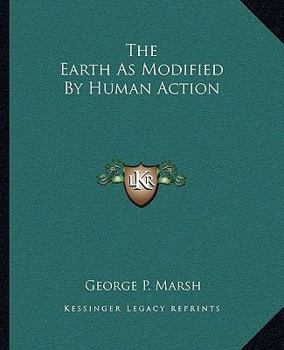The Earth As Modified By Human Action
(Part of the Weyerhaeuser Environmental Classics Series)
Select Format
Select Condition 
Book Overview
The Earth As Modified By Human Action is a book written by George P. Marsh, originally published in 1874. The book is an early work of environmental science and conservation, exploring the ways in which human activity has impacted the natural world. Marsh argues that human actions such as deforestation, agriculture, and industrialization have led to significant environmental degradation, including soil erosion, climate change, and the extinction of species. He also discusses the ways in which these changes have impacted human societies, including the spread of disease, famine, and social unrest. The book is considered a seminal work in the field of environmental science and has been influential in shaping modern conservation and sustainability efforts.There can be no doubt that moisture is given, out by trees and evaporated in extremely cold winter weather, and unless new fluid were supplied from the roots by the exercise of some vital function, the tree would be exhausted of its juices before winter was over. But this is not observed to be the fact, and, though the point is disputed, respectable authorities declare that ""wood felled in the depth of winter is the heaviest and fullest of sap.""This scarce antiquarian book is a facsimile reprint of the old original and may contain some imperfections such as library marks and notations. Because we believe this work is culturally important, we have made it available as part of our commitment for protecting, preserving, and promoting the world's literature in affordable, high quality, modern editions, that are true to their original work.
Format:Paperback
Language:English
ISBN:116269324X
ISBN13:9781162693248
Release Date:September 2010
Publisher:Kessinger Publishing
Length:572 Pages
Weight:2.14 lbs.
Dimensions:1.2" x 7.5" x 9.3"
Customer Reviews
4 ratings
Human Agency and Landscape Alteration
Published by Thriftbooks.com User , 19 years ago
Although a dipolmat by profession, Marsh was the first environmentalist to describe the interrelationships between environment and culture. Today he is best remembered for his key work, "Man and Nature." In that classic work, he was the first to suggest that human agency constituted a major element in landscape change. The accepted view held by prominent geographers and geologists of his day was that the physical aspects of the earth were entirely the result of natural process and phenomena, including topography, geological materials, erosion, weathering, climate, etc. Before Marsh, no one had ever thought to study the earth in ways that it was changed by human actions. After his pioneering work, no serious environmentalist or geoscientist can afford to overlook the consequences of those actions on the land. A well-read copy of this book belongs in the personal library of every earth scientist, environmentalist, and conservationist. Marsh's book is a MUST READ for anyone concerned about what people are doing to the earth.
A Very Modern Environmentalist, Writing in 1864!!!
Published by Thriftbooks.com User , 19 years ago
In 1864, George P. Marsh explained how civilizations create ecological disasters. His central thesis is that cutting down forests desrupts otherwise stable hydrological cycles, thereby causing erosion and degrading plant and animal habitats. The book is vaste, creative and detailed. An American from Vermont, Marsh also lived in Turkey and Italy, and pursued numerous careers, as diplomat, lawyer, businessman, and professor. His intense love of language and history merged with direct obersvations here and abroad to generate a remarkable breadth of knowlegde and a strong desire to communicate. In Man and Nature, Marsh is not only inspired, he is also happy to digress, particularly in the abundant footnotes.
Environmental Knowledge
Published by Thriftbooks.com User , 19 years ago
The depth of information provided in this remarkable book trasncends the test of time.
Enlightened analysis concerning Humankind's destructivness.
Published by Thriftbooks.com User , 26 years ago
Originally published in 1864, Marsh explains in wonderful detail the consequences of humankind's manipulation of earth's resources. Truly an enlightened thinker.






